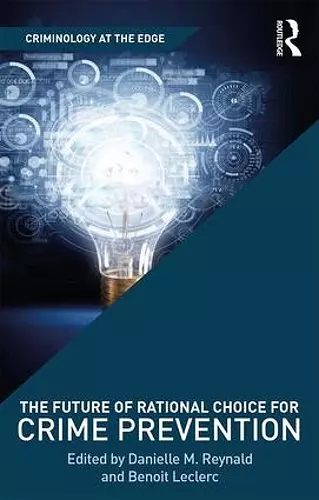The Future of Rational Choice for Crime Prevention
Benoit Leclerc editor Danielle Reynald editor
Format:Hardback
Publisher:Taylor & Francis Ltd
Published:21st Sep '17
Currently unavailable, and unfortunately no date known when it will be back
This hardback is available in another edition too:
- Paperback£45.99was £45.99(9780367227470)

The rational choice perspective (RCP) is currently the core theoretical approach underpinning situational crime prevention (SCP). To date, many crimes have been studied through the lens of RCP, which increased our understanding of these phenomena, how they are committed and how they could potentially be prevented through SCP. This book, designed with the hope of moving RCP forward for SCP purposes, takes a challenging but novel step in providing leading experts from different disciplines with the opportunity to express themselves on how we could best achieve this task.
This book explores various perspectives, which include the development of frameworks based on the role of situations in crime or forensic sciences for improving crime prevention practices. The need to consider affective states and other offender-related factors to improve our understanding of offender decision-making models is highlighted as a means to better predict which SCP mechanisms may be most useful in discouraging particular types of offenders. Finally, it is also argued that the use of RCP should be more pragmatic and that this perspective should be preserved and adapted based on what we find in our experiments.
Taken together, these theoretically distinctive and challenging contributions ultimately guide how crime prevention practices could be best approached in the future.
"Hurray! This is the book my students and I have been awaiting: a systematic rational discussion of the problems, advantages, and future directions of offender choice perspectives. Danielle Reynald and Benoit Leclerc have produced an essential book probing the foundations of scientific and practical crime prevention. Only irrational criminologists will ignore it."
- John E. Eck, Professor of Criminal Justice, University of Cincinnati, USA
"The idea that offending involves rational decision-making has been extremely important in criminology and has had significant practical implications for situational crime prevention. This book presents many insightful findings on these topics, including the influence of emotional factors as well as the subjective costs and benefits of offending, and the importance of interactions between types of people and types of situations. It should be of great interest to all criminologists, especially in advancing the understanding of offender decision-making and its implications for crime prevention."
- David P. Farrington, Emeritus Professor of Psychological Criminology, University of Cambridge, UK
"A closer look at Jeremy Bentham's original work shows that he had a very nuanced and diversified view of what pleasures and punishments people consider when they make decisions. Bentham was not fortunate enough to have the data or the accumulated research now available. In the current volume the contributors apply more modern knowledge to evaluate how offenders make choices, the nuances affecting their choices, and how this extra information helps us design lower crime rates."
- Marcus Felson, Professor in the School of Criminal Justice, Texas State University, USA
ISBN: 9781138217225
Dimensions: unknown
Weight: 272g
118 pages